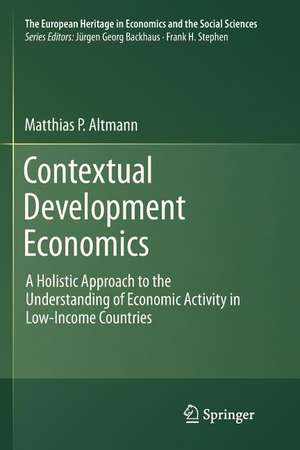Contextual Development Economics: A Holistic Approach to the Understanding of Economic Activity in Low-Income Countries: The European Heritage in Economics and the Social Sciences, cartea 8
Autor Matthias P. Altmannen Limba Engleză Paperback – 27 dec 2012
| Toate formatele și edițiile | Preț | Express |
|---|---|---|
| Paperback (1) | 641.03 lei 6-8 săpt. | |
| Springer – 27 dec 2012 | 641.03 lei 6-8 săpt. | |
| Hardback (1) | 647.59 lei 6-8 săpt. | |
| Springer – dec 2010 | 647.59 lei 6-8 săpt. |
Din seria The European Heritage in Economics and the Social Sciences
- 18%
 Preț: 954.62 lei
Preț: 954.62 lei - 15%
 Preț: 635.01 lei
Preț: 635.01 lei - 18%
 Preț: 1237.80 lei
Preț: 1237.80 lei - 18%
 Preț: 721.01 lei
Preț: 721.01 lei - 15%
 Preț: 631.86 lei
Preț: 631.86 lei - 15%
 Preț: 630.09 lei
Preț: 630.09 lei - 15%
 Preț: 630.75 lei
Preț: 630.75 lei - 15%
 Preț: 646.75 lei
Preț: 646.75 lei -
 Preț: 388.72 lei
Preț: 388.72 lei - 18%
 Preț: 784.61 lei
Preț: 784.61 lei - 18%
 Preț: 727.97 lei
Preț: 727.97 lei - 18%
 Preț: 947.04 lei
Preț: 947.04 lei - 18%
 Preț: 950.03 lei
Preț: 950.03 lei - 15%
 Preț: 641.85 lei
Preț: 641.85 lei - 15%
 Preț: 638.24 lei
Preț: 638.24 lei - 15%
 Preț: 636.63 lei
Preț: 636.63 lei - 15%
 Preț: 635.01 lei
Preț: 635.01 lei - 18%
 Preț: 1001.19 lei
Preț: 1001.19 lei - 15%
 Preț: 645.47 lei
Preț: 645.47 lei - 15%
 Preț: 639.25 lei
Preț: 639.25 lei - 15%
 Preț: 643.48 lei
Preț: 643.48 lei - 18%
 Preț: 952.09 lei
Preț: 952.09 lei - 18%
 Preț: 946.24 lei
Preț: 946.24 lei - 15%
 Preț: 637.78 lei
Preț: 637.78 lei
Preț: 641.03 lei
Preț vechi: 754.15 lei
-15% Nou
Puncte Express: 962
Preț estimativ în valută:
122.66€ • 128.08$ • 101.29£
122.66€ • 128.08$ • 101.29£
Carte tipărită la comandă
Livrare economică 15-29 aprilie
Preluare comenzi: 021 569.72.76
Specificații
ISBN-13: 9781461427650
ISBN-10: 1461427657
Pagini: 308
Ilustrații: XIX, 287 p.
Dimensiuni: 155 x 235 x 16 mm
Greutate: 0.44 kg
Ediția:2011
Editura: Springer
Colecția Springer
Seria The European Heritage in Economics and the Social Sciences
Locul publicării:New York, NY, United States
ISBN-10: 1461427657
Pagini: 308
Ilustrații: XIX, 287 p.
Dimensiuni: 155 x 235 x 16 mm
Greutate: 0.44 kg
Ediția:2011
Editura: Springer
Colecția Springer
Seria The European Heritage in Economics and the Social Sciences
Locul publicării:New York, NY, United States
Public țintă
ResearchCuprins
Introduction.- Poverty.- Transaction Costs.- Private Governance.- Informal Economic Activity.- The First Generation of Development Economists.- The Second Generation--Return to the Mainstream.- The Third Generation--Institutional Turn and the "New Development Economics".- Conclusions from the Past and the Agenda for a New Generation of Development Economics.- Emerging New Directions in Development Economics.- German Historical Economics as Development Economiccs.- From Stage Theories to the Concept of Economic Styles.- The Relevance of the Historical School for the Study of Low-Income Countries.- Conclusions.
Textul de pe ultima copertă
Poverty still persists in today’s low-income countries despite decades of international aid, and extensive research on the determinants of growth and development. The book argues that meeting this challenge requires a holistic understanding of the context-specific factors that influence economic behavior and structures in poor countries. Contextual Development Economics approaches this task by offering a methodology that allows analysing the dynamic interrelations between economic, cultural and historical determinants of economic life in low-income countries. The book starts with an empirical inquiry into the economic characteristics of low-income countries that create the context by which the specific forms of organising economic activity in these countries are determined. It then looks at how different generations of development economists sought to explain economic realities in low-income countries from the 1940s through today. The book finally synthesises the results from this empirical and methodological analysis with insights from an inquiry into contributions of the German Historical School, from which it borrows the concept of the economic style as a methodological alternative to the universal and hence often irrelevant models of mainstream development economics.This book offers a promising perspective for the future of development economics that will be of interest to researchers and development practitioners alike. It will also be relevant for academics and students with an interest in applications of the method and concepts of the Historical School to contemporary problems. "Altmann writes with uncommon insight about the economic style of low-income countries and the prospects of development assistance to become more effective and sustainable by delivering context-specific solutions that build on the needs and ingenuity of the poor."--Wolfgang Schmitt, former head of Deutsche Gesellschaft für Technische Zusammenarbeit (GTZ--German TechnicalCooperation)
Caracteristici
Scrutinizes and advances development economics from a methodological standpoint Sharpens the methods of development research in order to reach more policy-relevant and context-specific conclusions Makes accessible to English-speaking scholars a body of literature previously tied to the German language










